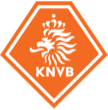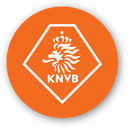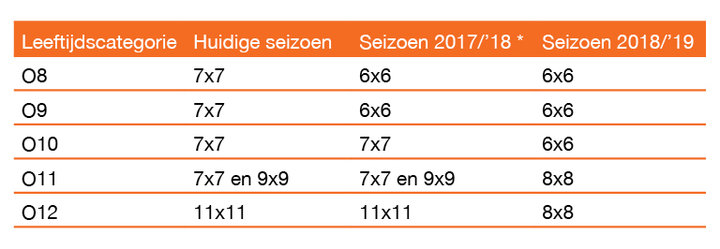
HOW WAS THE DECISION REACHED?
HOW WAS THE DECISION REACHED?
In May 2016, the KNVB ('Royal Dutch Football Association') concluded its survey into optimal game formats for youth football and published the survey report including recommendations. The key recommendation is the need to adapt the current structure of youth football if we wish to continue to drive for our goal of optimal enjoyment and development. The KNVB also announced its intention to implement the new game format structure as of the 2017/2018 season and to do so together with the clubs. Clubs know from the day-to-day reality exactly what works and what not, and this know-how has been taken into account during the drafting of this report.
In the first half of the 2016/2017 season, the KNVB was focused on informing clubs about the reasons for the proposed restructuring of youth football, and the implications for clubs. Moreover, clubs were asked to make an active contribution by trialing the new game formats and helping with their implementation.
Clubs were requested to deliver their feedback in various ways so that the KNVB could most effectively address the structure of the new game formats.
the 2017/2018 season
The new game format and accompanying new rules will be phased in over two seasons. As of the 2017/2018 season, the KNVB will start to phase in a new 6 versu 6 format for the U8s and U9s. In addition, the KNVB recommends that those footballers taking their very first steps in the game play a new 2 versus 2 format and the U7s play a new 4 versus 4 format. Comprehensive overview.
the 2017/2018 season
As of the 2018/2019 season, the KNVB will introduce a new 6v6 format for the under 10s and a new 8 versus 8 format for the under 11s and under 12s. During the season ahead, special attention will be paid to the transition to the under 12 and under 13 age-groups, because many clubs experience the transition from half to full-sized pitches as significant. The 9 versus 9 game format will also be taken into account during this transition.

Chairman's conference
september 16th & 17th


ROADSHOWS
september 19th through october 14th


pilots and workshops
OCTOBER AND NOVEMBER
The people who deal with youth football on a daily basis know best what's going on. That's why the KNVB asked the clubs to help structure the new game formats by trialing them. On the one hand, by organising pilots, individually or in partnership with other clubs. On the other hand, by offering clubs the opportunity to attend a KNVB workshop. Read more


Survey by blauw research
december / january
The vast majority of those involved in youth football embrace the vision of a child-centred approach. No fewer than 82% of the respondents to a feasibility study conducted by Blauw Research indicate their endorsement of the KNVB's objective of striving for the optimal enjoyment and development of a child. More about the survey


Informing the clubs
as of january 26th
pilots and workshops
Various options were examined during these pilots and workshops. Clubs that notified the KNVB of a pilot they held and/or attended a workshop were invited to provide feedback through an online survey. The outstanding issues were addressed, based partially on feedback received. Respondent preference was the point of departure in developing the revised player pathway. The decision was also based on research into optimal game formats and the KNVB's point of view in this respect. For a more detailed overview of the framework structure, reference is made to the page of the relevant game format.
Survey by Blauw Research
December/january
In addition to the willingness to change, clubs also expressed their concern about practical areas of attention that complicate full implementation by the start of the 2017/2018 season. Over half of the clubs (55%) indicate in the survey that they are able or expect to be able to kick off next season with all teams structured according to the new game formats. Although a majority of clubs estimate that full implementation is feasible, the decision has been taken to go for phased implementation. On the one hand, because the majority is simply not convincing enough; on the other, because clubs, despite the feasibility, prefer a phased implementation. Clubs expressed a preference to kick off the 2017/2018 season with the youngest age-groups (U8s and U9s). This means implementation of the new game formats will be phased in over the next two seasons, starting with the U8s and U9s as of the 2017/2018 season.
What's in store for the competition?
The competition structure for youth football, as of the season ahead, is as follows:

* An evaluation of the new game formats and experience with the new rules will be held mid-season 2017/2018.
6 versus 6
u8s and u9s
As of the 2017/2018 season, the KNVB will start to phase in a competition using a new 6v6 format for the U8s and U9s. The KNVB will facilitate these competitions, for which clubs can register freely. Throughout the Netherlands, a so-called year-of-birth competition and corresponding football package (=number of games) will be on offer for all youth players. Read more
Recommendation
2 versus 2
u6s
For those taking their very first steps in the game - children aged four or five - the KNVB advises clubs to organise a 2v2 format. This format enables children to enjoy more touches of the ball, more goals and scoring attempts, and greater involvement in the game. Ideally, these games are organised within the framework of a tournament with a changing team composition, either within the club or with neighbouring clubs. The KNVB will not be organising a competition for this age-group. Read more
Recommendation
4 versus 4
u7s
The KNVB recommends that the U7 minis play in a 4v4 game format. For this age-group, clubs can organise games within the framework of a tournament on their own grounds or in the neighbourhood. Preferably, the minis are moved from team to team for each game so that a flow of new teams is created. Should a club not be able to organise this itself, the KNVB in partnership with ING will offer support to make it happen. In addition, the KNVB will continue to shape league tables for which the clubs can continue to register in the usual way. Read more